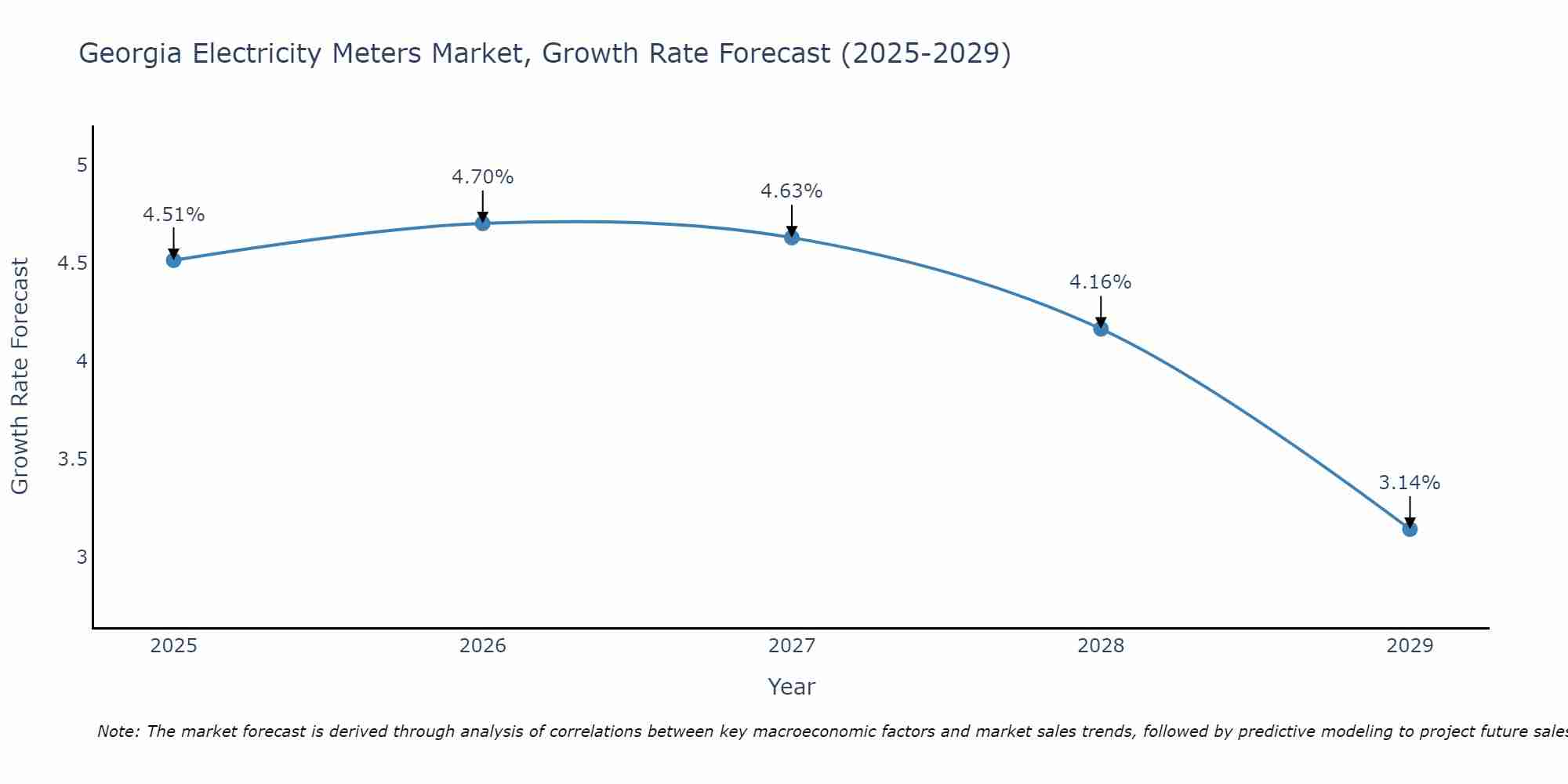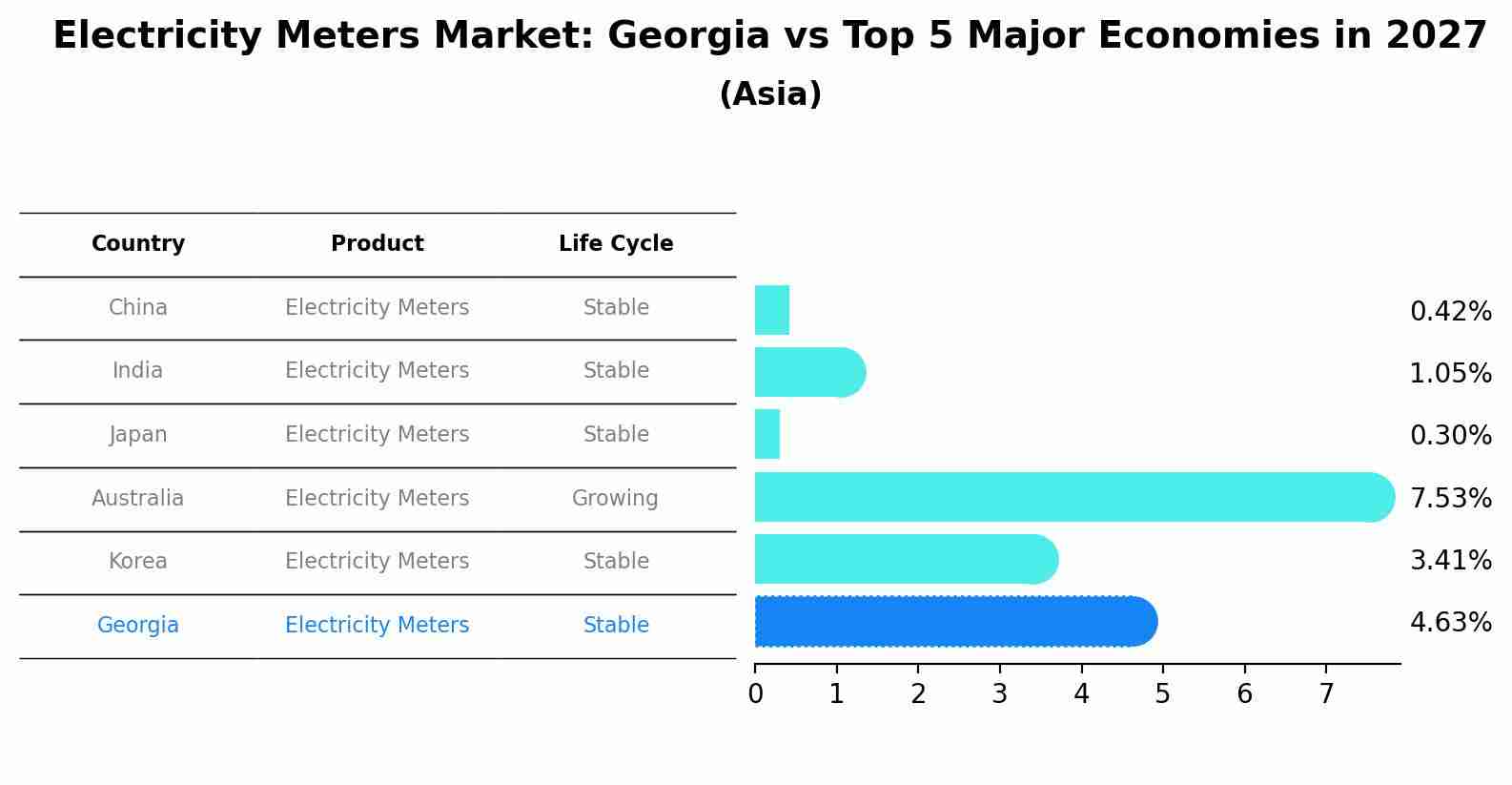Georgia Electricity Meters Market Outlook | Share, Value, Industry, Size, Growth, Analysis, COVID-19 IMPACT, Revenue, Trends, Forecast & Companies
| Product Code: ETC432956 | Publication Date: Oct 2022 | Updated Date: Jul 2025 | Product Type: Market Research Report | |
| Publisher: 6Wresearch | Author: Dhaval Chaurasia | No. of Pages: 75 | No. of Figures: 35 | No. of Tables: 20 |
Georgia Electricity Meters Market Size Growth Rate
The Georgia Electricity Meters Market is projected to witness mixed growth rate patterns during 2025 to 2029. Starting at 4.51% in 2025, the market peaks at 4.70% in 2026, and settles at 3.14% by 2029.

Electricity Meters Market: Georgia vs Top 5 Major Economies in 2027 (Asia)
By 2027, the Electricity Meters market in Georgia is anticipated to reach a growth rate of 4.63%, as part of an increasingly competitive Asia region, where China remains at the forefront, supported by India, Japan, Australia and South Korea, driving innovations and market adoption across sectors.

Georgia Electricity Meters Market Synopsis
The Georgia electricity meters market is witnessing steady growth due to the increasing adoption of advanced metering infrastructure (AMI) systems in the state. The implementation of smart meters is driving the market as utilities seek to enhance grid efficiency and enable real-time monitoring of electricity consumption. Georgia`s focus on energy efficiency and sustainability is also contributing to the market`s expansion, with a growing emphasis on renewable energy sources and demand-side management programs. Key players in the Georgia electricity meters market include Landis+Gyr, Itron Inc., and Honeywell International Inc., offering a range of smart metering solutions to utilities and consumers. The market is expected to continue growing as the state aims to modernize its electricity infrastructure and improve overall energy management capabilities.
Georgia Electricity Meters Market Trends
The Georgia Electricity Meters Market is experiencing a shift towards smart meters, driven by the increasing demand for energy efficiency and grid modernization. Smart meters offer benefits such as real-time monitoring of electricity consumption, improved accuracy in billing, and the ability to integrate with smart grid technologies. This trend is being further accelerated by regulatory mandates encouraging the deployment of smart meters to enhance energy management and reduce operational costs for utilities. Additionally, there is a growing focus on integrating renewable energy sources into the grid, which is driving the adoption of advanced metering infrastructure to support bi-directional energy flow and enable more efficient energy management. Overall, the Georgia Electricity Meters Market is witnessing a transition towards smart metering solutions to meet the evolving needs of both utilities and consumers.
Georgia Electricity Meters Market Challenges
In the Georgia Electricity Meters Market, challenges include the need for advanced metering infrastructure to support smart grid initiatives, ensuring data security and privacy for customers, regulatory hurdles related to metering technology upgrades, and the high cost of deploying new metering systems. Additionally, interoperability issues between different metering technologies and systems can create barriers to seamless data exchange and integration. Furthermore, the market may face challenges related to public acceptance and awareness of the benefits of smart meters, as well as potential resistance from traditional metering industry stakeholders. Overall, navigating these challenges requires a comprehensive approach that considers technological advancements, regulatory frameworks, and stakeholder engagement to drive successful deployment and utilization of electricity meters in Georgia.
Georgia Electricity Meters Market Investment Opportunities
The Georgia Electricity Meters Market presents several investment opportunities, driven by the increasing focus on energy efficiency and smart grid technology. Investors can explore opportunities in the deployment of smart meters, which offer real-time monitoring and data analytics for better energy management. Additionally, there is a growing demand for advanced metering infrastructure (AMI) solutions to enable two-way communication between utilities and consumers, leading to improved grid reliability and operational efficiency. Investing in companies involved in meter manufacturing, software development for meter data management, and installation services could prove lucrative in this market. With the government`s push towards modernizing the energy sector and promoting sustainability, the Georgia Electricity Meters Market offers promising investment prospects for those looking to capitalize on the evolving energy landscape.
Jordan Agar Market Government Policies
The Georgia Electricity Meters Market is regulated by the Georgia Public Service Commission (PSC), which oversees the pricing and operations of electric utilities in the state. The PSC sets regulations for the installation and maintenance of electricity meters to ensure accurate billing and fair practices. The PSC also promotes energy efficiency through various programs and initiatives aimed at encouraging the use of advanced metering technologies and smart meters. Additionally, the PSC monitors utility companies to ensure compliance with state laws and regulations regarding electricity metering. Overall, the government policies in Georgia emphasize the importance of reliable and efficient electricity metering systems to meet the needs of consumers and promote sustainable energy practices.
Georgia Electricity Meters Market Future Outlook
The Georgia Electricity Meters Market is poised for steady growth in the coming years driven by increasing investments in smart grid infrastructure and the rising adoption of advanced metering technologies. The state`s focus on modernizing its energy infrastructure to improve efficiency and reliability will fuel the demand for smart meters and other innovative solutions. Additionally, regulatory mandates promoting the deployment of smart meters and the integration of renewable energy sources are expected to further drive market growth. With utilities and energy companies increasingly investing in digital transformation and grid modernization initiatives, the Georgia Electricity Meters Market is likely to witness sustained expansion, offering opportunities for meter manufacturers, technology providers, and service providers to capitalize on this evolving landscape.
Key Highlights of the Report:
- Georgia Electricity Meters Market Outlook
- Market Size of Georgia Electricity Meters Market, 2021
- Forecast of Georgia Electricity Meters Market, 2031
- Historical Data and Forecast of Georgia Electricity Meters Revenues & Volume for the Period 2018 - 2031
- Georgia Electricity Meters Market Trend Evolution
- Georgia Electricity Meters Market Drivers and Challenges
- Georgia Electricity Meters Price Trends
- Georgia Electricity Meters Porter's Five Forces
- Georgia Electricity Meters Industry Life Cycle
- Historical Data and Forecast of Georgia Electricity Meters Market Revenues & Volume By Type for the Period 2018 - 2031
- Historical Data and Forecast of Georgia Electricity Meters Market Revenues & Volume By Single Phase for the Period 2018 - 2031
- Historical Data and Forecast of Georgia Electricity Meters Market Revenues & Volume By Three Phase for the Period 2018 - 2031
- Historical Data and Forecast of Georgia Electricity Meters Market Revenues & Volume By Analog for the Period 2018 - 2031
- Historical Data and Forecast of Georgia Electricity Meters Market Revenues & Volume By Smart for the Period 2018 - 2031
- Historical Data and Forecast of Georgia Electricity Meters Market Revenues & Volume By Application for the Period 2018 - 2031
- Historical Data and Forecast of Georgia Electricity Meters Market Revenues & Volume By Residential for the Period 2018 - 2031
- Historical Data and Forecast of Georgia Electricity Meters Market Revenues & Volume By Commercial for the Period 2018 - 2031
- Historical Data and Forecast of Georgia Electricity Meters Market Revenues & Volume By Industrial for the Period 2018 - 2031
- Historical Data and Forecast of Georgia Electricity Meters Market Revenues & Volume By Others for the Period 2018 - 2031
- Georgia Electricity Meters Import Export Trade Statistics
- Market Opportunity Assessment By Type
- Market Opportunity Assessment By Application
- Georgia Electricity Meters Top Companies Market Share
- Georgia Electricity Meters Competitive Benchmarking By Technical and Operational Parameters
- Georgia Electricity Meters Company Profiles
- Georgia Electricity Meters Key Strategic Recommendations
Frequently Asked Questions About the Market Study (FAQs):
- Single User License$ 1,995
- Department License$ 2,400
- Site License$ 3,120
- Global License$ 3,795
Search
Thought Leadership and Analyst Meet
Our Clients
Related Reports
- Afghanistan Apparel Market (2026-2032) | Growth, Outlook, Industry, Segmentation, Forecast, Size, Companies, Trends, Value, Share, Analysis & Revenue
- Canada Oil and Gas Market (2026-2032) | Share, Segmentation, Value, Industry, Trends, Forecast, Analysis, Size & Revenue, Growth, Competitive Landscape, Outlook, Companies
- Germany Breakfast Food Market (2026-2032) | Industry, Share, Growth, Size, Companies, Value, Analysis, Revenue, Trends, Forecast & Outlook
- Australia Briquette Market (2025-2031) | Growth, Size, Revenue, Forecast, Analysis, Trends, Value, Share, Industry & Companies
- Vietnam System Integrator Market (2025-2031) | Size, Companies, Analysis, Industry, Value, Forecast, Growth, Trends, Revenue & Share
- ASEAN and Thailand Brain Health Supplements Market (2025-2031) | Strategy, Consumer Insights, Analysis, Investment Trends, Opportunities, Growth, Size, Share, Industry, Revenue, Segments, Value, Segmentation, Supply, Forecast, Restraints, Outlook, Competition, Drivers, Trends, Demand, Pricing Analysis, Competitive, Strategic Insights, Companies, Challenges
- ASEAN Bearings Market (2025-2031) | Strategy, Consumer Insights, Analysis, Investment Trends, Opportunities, Growth, Size, Share, Industry, Revenue, Segments, Value, Segmentation, Supply, Forecast, Restraints, Outlook, Competition, Drivers, Trends, Demand, Pricing Analysis, Competitive, Strategic Insights, Companies, Challenges
- Europe Flooring Market (2025-2031) | Outlook, Share, Industry, Trends, Forecast, Companies, Revenue, Size, Analysis, Growth & Value
- Saudi Arabia Manlift Market (2025-2031) | Outlook, Size, Growth, Trends, Companies, Industry, Revenue, Value, Share, Forecast & Analysis
- Uganda Excavator, Crane, and Wheel Loaders Market (2025-2031) | Strategy, Consumer Insights, Analysis, Investment Trends, Opportunities, Growth, Size, Share, Industry, Revenue, Segments, Value, Segmentation, Supply, Forecast, Restraints, Outlook, Competition, Drivers, Trends, Demand, Pricing Analysis, Competitive, Strategic Insights, Companies, Challenges
Industry Events and Analyst Meet
Whitepaper
- Middle East & Africa Commercial Security Market Click here to view more.
- Middle East & Africa Fire Safety Systems & Equipment Market Click here to view more.
- GCC Drone Market Click here to view more.
- Middle East Lighting Fixture Market Click here to view more.
- GCC Physical & Perimeter Security Market Click here to view more.
6WResearch In News
- Doha a strategic location for EV manufacturing hub: IPA Qatar
- Demand for luxury TVs surging in the GCC, says Samsung
- Empowering Growth: The Thriving Journey of Bangladesh’s Cable Industry
- Demand for luxury TVs surging in the GCC, says Samsung
- Video call with a traditional healer? Once unthinkable, it’s now common in South Africa
- Intelligent Buildings To Smooth GCC’s Path To Net Zero


















